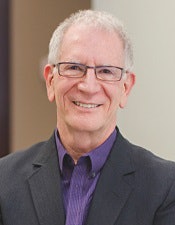
A patient scheduled a telephone consultation with me the other day. Her problem had distressed her for years, and she was clearly frustrated.
She explained to me that she had bad breath for more than 10 years. She described how her coworkers would shy away from her, and only her closest friends would tell her that she had bad breath.
 Alvin Danenberg, DDS.
Alvin Danenberg, DDS.She went to her medical doctor years ago to try to figure out what was going on, only to be rebuked. Her physician rejected the whole idea and said her bad breath was not caused by a medical problem.
Then my patient went to her dentist who examined her mouth and suggested more frequent cleaning appointments with the dental hygienist. That made sense, but after repeated cleanings, there was no difference. Confused, the patient began to research other solutions for her problem.
During her unsuccessful efforts to find the answers, she did begin to eat a more nutritionally balanced diet. She felt better and had more energy, but she still had bad breath. She discovered me online and sought my opinions.
I explained the obvious causes of bad breath, which she already had investigated. Then I explained some underlying medical issues, which could be the cause and which needed to be ruled out by a physician. Her previous physician never suggested these steps.
I gave this patient the names of physicians who also practiced functional medicine in her local area and who could perform a thorough medical exam incorporating functional testing. Finally, I made some recommendations for her to try right away. What follows is a summary of my discussion with the patient.
Obvious causes
First, look for the most obvious causes. While this patient had done this research, it is worth reminding your patients of potential causes.
Many patients may not know that most bad breath comes from gum infections, decaying food particles in the mouth, or foods that produce strong odors as they are digested. I remind my patients to clean their mouths correctly and efficiently.
I also remind them that there is very little they can do when they eat foods that create odors, such as garlic and onions. As these foods are being digested, gas is produced, which can pass through the lungs and is exhaled as bad breath. I suggest that the odors might be reduced if the foods are cooked rather than eaten raw. I also emphasize that eating green leafy vegetables either during or after the offending foods may help neutralize some odoriferous foods.
Since the patient had addressed these causes with no change in her bad breath, I then delved into the causes that may not be as obvious.
Not-so-obvious causes
“When my team and I take a patient's health history, we always ask about prescription medications and nutritional supplements.”
When my team and I take a patient's health history, we always ask about prescription medications and nutritional supplements. These can create unique and unpleasant odors, depending on the medication or supplement. To remove bad breath odors, the patient will need to stop taking these.
Dry mouth or reduced saliva flow also may cause bad breath. Again, this may be a result of your patient taking certain medications, or it may be a result of a disease in, or damage to, the salivary glands.
Bad breath also could be a result of psychological stress, which often may reduce salivary flow. In some instances, reminding my patients to have water available to drink as frequently as necessary may help with their breath issue.
Tonsils and diet
The tonsils can lodge calcified bacteria, known as tonsil stones. They may look like small, white nodules and can harbor significant odor. Sometimes, having the patient gargle with warm salt water may be able to dislodge them. If not, this may be a treatment you or an ear, nose, and throat (ENT) specialist can resolve.
If after those steps, the patient is still experiencing bad breath, I recommend a nutrient-dense, anti-inflammatory diet. Nutrient-dense foods and anti-inflammatory foods will help keep bad bacteria in check and will support a healthy immune system.
Physician involvement?
Many of the causes I have described up to this point are under your patient's control. The following are trickier and will require a healthcare professional.
I have referred patients to a physician to rule out specific diseases, such as infections and lesions in the sinuses, stomach, lungs, intestinal tract, pancreas, liver, and kidneys. Medical tests may be needed for your patient at this point.
Also, if foods are not digested properly and completely, their remaining particles could become putrid and create strong odors. This may also require a referral to a physician for further testing.
In some instances, a stool test may be ordered. Also, testing for small intestinal bacterial overgrowth (SIBO) through breath analysis may be helpful. These tests could pinpoint overgrowth of bacteria, yeast, or parasites in the digestive tract.
The physician may suggest or prescribe botanical or prescription medicines if unhealthy levels of these microbes are discovered. If inadequate digestion were diagnosed, various supplements such as digestive enzymes and betaine hydrochloride might be recommended. In addition, fiber (from vegetables and fruits) and good bacteria (from fermented foods) would be beneficial.
Bad breath affects everyone at times. But, it is pathologic for bad breath to last for a long time. There is always a cause, but sometimes getting to the cause may be tricky and requires persistence for the patient and for you.
A version of this column first ran on Dr. Danenberg's blog. DrBicuspid.com appreciates the opportunity to reprint it. Future columns will address how dentists can serve their patients and their profession.
Alvin Danenberg, DDS, practices at the Bluffton Center for Dentistry in Bluffton, SC. He is also on the faculty of the College of Integrative Medicine and created its integrative periodontal teaching module. He also spent two years as chief of periodontics at Charleston Air Force Base earlier in his career. His website is drdanenberg.com.
The comments and observations expressed herein do not necessarily reflect the opinions of DrBicuspid.com, nor should they be construed as an endorsement or admonishment of any particular idea, vendor, or organization.



















